Arikoyama Castle and Izushi Castle
-Castle looking down small basin from high place-
Overview
Name: Arikoyama castle (Arikoyama-jo) /Izushi castle (Izushi-jo)
Alias:
Place: Uchi-machi Izushi-cho Toyooka city, Hyogo
Location: 35.455698520625475, 134.8769469551039
Type: Mountain Castle / hill castle
Built: 16th century / 17th century
Remnants: Stone walls, clay walls and moats
Title: 100 more famous Japanese castles
Arikoyama castle (有子山城) and Izushi castle (出石城) is located at Shiroyama moutain, which is 320 meter above sea level at south edge of Izushi basin. Izushi basin is a small basin along with Izushigawa river, at the southeast of Toyooka basin.
Izushi area is a little apart from Toyooka area which has been the center of Tajima province (north part of Hyogo prefecture), but it is an important place of communication connects to Fukuchiyama city of Tanba province (north western part of Kyoto prefecture) or Tango province (north part of Kyoto prefecture). Arikoyama castle is the name of old hilltop castle, and Izushi castle is the name of newer hillside residence.
Arikoyama castle is located at the top of Shiroyama mountain built by Yamana clan in 1574. Yamana clan was a strong samurai family and relative of Ashikaga clan which was the house of Shogun at Muromachi Shogunate, thus at the beginning of Muromachi era Yamana clan managed 11 of 66 provinces of Japan mainly at Sanin region, and said as "one sixth lord". Being cautious of its power once Yamana clan was suppressed by Shogunate, but later Mochitoyo Yamana (1404-1473) regained its power and became the leader of one side at the battle of Onin. a long time continued internal war from 1467 to 1477.
But due to the burden of the battle and internal conflict, Yamana clan rapidly lost their power after the war. Harima province (south part of Hyogo prefecture) was deprived by Akamatsu clan, and barely Houki province and Inaba province (Tottori prefecture) was kept but was suppressed by warlords such as Amago clan or Mouri clan.
In Tajima province Yamana clan once lost its authority, and the power of the clan was limited by four major retainer such as Otagaki clan which was the lord of Tekeda castle, Kakiya clan at Toyooka castle or Yagi clan. Yamana clan which was deprived Toyooka area by Kakiya clan moved to Izushi area and survived there.
Originally there was a castle named Korosumiyama castle at 2 kilometer north of Arikoyama castle. Yamana clan struggled to restore its authority at this castle, and at the middle of 16th century Suketoyo Yamana (1511-1580) succeeded to control local retainers and restored Yamana clan to some extent. But in 1569, central ruler Nobunaga Oda (1534-1582) ordered to his general Hideyoshi Hashiba (1537-1598) to attack Yamana clan, and Konomiyama castle fell before attack of Hideyoshi.
Suketoyo once left Konomiyama castle and later met with Nobunaga, and was approved to keep Izushi area. In 1574, considering fall of Koresumiyama castle, Suketoyo built new castle at more higher place and named it as Arikoyama castle.
Suketoyo served Nobunaga for several years, but in 1585 when Hideyoshi fought with Mouri clan, a large power of Chugoku region, Otagaki clan which was an important retainer of Yamana clan and lord at Takeda castle (Hyogo prefecture) voluntary changed to Mouri clan. Because of this fact Yamana clan was regarded as an enemy of Oda clan, and in 1580 Hideyoshi attacked Yamana clan again. Secure Arikoyama castle could not stop the attack of Hideyoshi and fell, then history of Yamana clan as a warlord has ended.
Hideyoshi placed his trustable younger brother Hidenaga Toyotomi (1540-1591) as a lord of Arikoyama castle. Hidenaga reformed Arikoyama castle into a modern castle with stone walls, and it is said that later castle construction master Takatora Todo (1556-1630) who was the retainer of Hidenaga built this castle as his first construction.
Ordinary mountain castles are built at mountains of about 200 meter tall from hillside, considering the balance of security and convenience. But the height of Arikoyama mountain is over 250 meter and clearly taller than other castles. Climbing road to castle is so steep then it is necessary to climb holding guide rope over 30 minutes. Because of its height and sheer slope, from hilltop castle beautiful scenery of whole Izushi basin surrounded by mountains is clearly seen.
Main areas of Arikoyama castle spread over a ridge continued from hilltop to westward. Hilltop area is separated into front side central area and backside Senjyojiki area by huge dry moat of nearly 30 meter width. Central area is a rectangular area of 80 meter long and 20 meter width, and protected by rough stone walls. At the southeast of the area there is a broken basement of main tower. On the other hand, Senjyojiki area is a larger area of 120 meter long and 60 meter width, and might be used as a residential area.
Below central area, there are five terraces spread along with the ridge. Each area is also guarded by stone walls, and paths connect each area goes beside stone walls. Stone walls between central area and secondary area is a tall one with magnificent stone steps, and backside of third area also has tall wall. Just below the main area, there is a small terrace named water area having well. The valley just below this water area is also a main gate from hillside, and guarded by five layer of stone walls.
In 1585 Hidenaga became the lord of Yamato province (Nara prefecture) and Kii province (Wakayama prefecture) and moved to Koriyama castle, then Nagayasu Maeno (1528-1595), one of the oldest retainer of Hideyoshi was appointed as a lord. But Nagayasu was involved in the purge of Hidetsugu Toyotomi (1568-1595) and forced to die, then Koide clan became the lord of the castle.
After the battle of Sekigahara in 1600, Koide clan survived as a feudal lord under Edo Shogunate abolished mountain top castle and built Izushi castle in 1604. Structure of hilltop area might be kept by 1615, but because of Ikkoku Ichijyo rei (one domain one castle rule) finally this area was broken.
Izushi castle at hillside of Shiroyama castle was built utilizing hillside residence of Arikoyama castle. Izushi castle spread at the northwest corner of the mountain, and four layer of terraces were built along with the slope. Uncommon for other castle, the highest area named Inarikaku is used as a place of shrine, and central area existed next level. Even though it is a small castle of about 100 meter long square, but each terraces have magnificent stone walls and had corner turrets.
In 1696, Koide clan was extinguished because of no successor, and in 1706 Sengoku clan was moved from Ueda castle (Nagano prefecture). Sengoku clan brought soba noodle from their former territory, and soba noodle became the specialty of Izushi area. Although territory was decreased because of internal dispute, Sengoku clan served as a lord of Izushi domain until the end of Edo era.
Subsequent to Meiji revolution, all building of Izushi castle was broken, but one clock tower built just after the revolution still remain. Traditional houses well remain in castle town, and Izushi area is famous as a little Kyoto in Tajima province. Exterior of turrets, gate and bridge are restored, and combination of stone wall and white wall buildings is a beautiful view especially in autumn season.
Bus trip from JR West Sanin-Honsen line Toyooka station. 60 minutes drive from Bantan Renraku Doro tall road Wadayama interchange. 60 minutes walk from hillside entrance to hilltop castle.
Ueda Castle -Beat overwhelming enemy twice with small troops-
Konosumiyama Castle -10 year battle at capital city for the purpose of battle itself-
Type: Mountain Castle / hill castle
Built: 16th century / 17th century
Remnants: Stone walls, clay walls and moats
Title: 100 more famous Japanese castles
Brief History
Arikoyama castle (有子山城) and Izushi castle (出石城) is located at Shiroyama moutain, which is 320 meter above sea level at south edge of Izushi basin. Izushi basin is a small basin along with Izushigawa river, at the southeast of Toyooka basin.
Izushi area is a little apart from Toyooka area which has been the center of Tajima province (north part of Hyogo prefecture), but it is an important place of communication connects to Fukuchiyama city of Tanba province (north western part of Kyoto prefecture) or Tango province (north part of Kyoto prefecture). Arikoyama castle is the name of old hilltop castle, and Izushi castle is the name of newer hillside residence.
History of Yamana clan
Arikoyama castle is located at the top of Shiroyama mountain built by Yamana clan in 1574. Yamana clan was a strong samurai family and relative of Ashikaga clan which was the house of Shogun at Muromachi Shogunate, thus at the beginning of Muromachi era Yamana clan managed 11 of 66 provinces of Japan mainly at Sanin region, and said as "one sixth lord". Being cautious of its power once Yamana clan was suppressed by Shogunate, but later Mochitoyo Yamana (1404-1473) regained its power and became the leader of one side at the battle of Onin. a long time continued internal war from 1467 to 1477.
But due to the burden of the battle and internal conflict, Yamana clan rapidly lost their power after the war. Harima province (south part of Hyogo prefecture) was deprived by Akamatsu clan, and barely Houki province and Inaba province (Tottori prefecture) was kept but was suppressed by warlords such as Amago clan or Mouri clan.
In Tajima province Yamana clan once lost its authority, and the power of the clan was limited by four major retainer such as Otagaki clan which was the lord of Tekeda castle, Kakiya clan at Toyooka castle or Yagi clan. Yamana clan which was deprived Toyooka area by Kakiya clan moved to Izushi area and survived there.
Build of Arikoyama castle by Yamana clan
Originally there was a castle named Korosumiyama castle at 2 kilometer north of Arikoyama castle. Yamana clan struggled to restore its authority at this castle, and at the middle of 16th century Suketoyo Yamana (1511-1580) succeeded to control local retainers and restored Yamana clan to some extent. But in 1569, central ruler Nobunaga Oda (1534-1582) ordered to his general Hideyoshi Hashiba (1537-1598) to attack Yamana clan, and Konomiyama castle fell before attack of Hideyoshi.
Suketoyo once left Konomiyama castle and later met with Nobunaga, and was approved to keep Izushi area. In 1574, considering fall of Koresumiyama castle, Suketoyo built new castle at more higher place and named it as Arikoyama castle.
Suketoyo served Nobunaga for several years, but in 1585 when Hideyoshi fought with Mouri clan, a large power of Chugoku region, Otagaki clan which was an important retainer of Yamana clan and lord at Takeda castle (Hyogo prefecture) voluntary changed to Mouri clan. Because of this fact Yamana clan was regarded as an enemy of Oda clan, and in 1580 Hideyoshi attacked Yamana clan again. Secure Arikoyama castle could not stop the attack of Hideyoshi and fell, then history of Yamana clan as a warlord has ended.
Reform and structure of Arikoyama castle
Hideyoshi placed his trustable younger brother Hidenaga Toyotomi (1540-1591) as a lord of Arikoyama castle. Hidenaga reformed Arikoyama castle into a modern castle with stone walls, and it is said that later castle construction master Takatora Todo (1556-1630) who was the retainer of Hidenaga built this castle as his first construction.
Ordinary mountain castles are built at mountains of about 200 meter tall from hillside, considering the balance of security and convenience. But the height of Arikoyama mountain is over 250 meter and clearly taller than other castles. Climbing road to castle is so steep then it is necessary to climb holding guide rope over 30 minutes. Because of its height and sheer slope, from hilltop castle beautiful scenery of whole Izushi basin surrounded by mountains is clearly seen.
Main areas of Arikoyama castle spread over a ridge continued from hilltop to westward. Hilltop area is separated into front side central area and backside Senjyojiki area by huge dry moat of nearly 30 meter width. Central area is a rectangular area of 80 meter long and 20 meter width, and protected by rough stone walls. At the southeast of the area there is a broken basement of main tower. On the other hand, Senjyojiki area is a larger area of 120 meter long and 60 meter width, and might be used as a residential area.
Below central area, there are five terraces spread along with the ridge. Each area is also guarded by stone walls, and paths connect each area goes beside stone walls. Stone walls between central area and secondary area is a tall one with magnificent stone steps, and backside of third area also has tall wall. Just below the main area, there is a small terrace named water area having well. The valley just below this water area is also a main gate from hillside, and guarded by five layer of stone walls.
Abolish of Arikoyama castle and build of Izushi castle
In 1585 Hidenaga became the lord of Yamato province (Nara prefecture) and Kii province (Wakayama prefecture) and moved to Koriyama castle, then Nagayasu Maeno (1528-1595), one of the oldest retainer of Hideyoshi was appointed as a lord. But Nagayasu was involved in the purge of Hidetsugu Toyotomi (1568-1595) and forced to die, then Koide clan became the lord of the castle.
After the battle of Sekigahara in 1600, Koide clan survived as a feudal lord under Edo Shogunate abolished mountain top castle and built Izushi castle in 1604. Structure of hilltop area might be kept by 1615, but because of Ikkoku Ichijyo rei (one domain one castle rule) finally this area was broken.
Izushi castle at hillside of Shiroyama castle was built utilizing hillside residence of Arikoyama castle. Izushi castle spread at the northwest corner of the mountain, and four layer of terraces were built along with the slope. Uncommon for other castle, the highest area named Inarikaku is used as a place of shrine, and central area existed next level. Even though it is a small castle of about 100 meter long square, but each terraces have magnificent stone walls and had corner turrets.
In 1696, Koide clan was extinguished because of no successor, and in 1706 Sengoku clan was moved from Ueda castle (Nagano prefecture). Sengoku clan brought soba noodle from their former territory, and soba noodle became the specialty of Izushi area. Although territory was decreased because of internal dispute, Sengoku clan served as a lord of Izushi domain until the end of Edo era.
Afterward of the castle
Subsequent to Meiji revolution, all building of Izushi castle was broken, but one clock tower built just after the revolution still remain. Traditional houses well remain in castle town, and Izushi area is famous as a little Kyoto in Tajima province. Exterior of turrets, gate and bridge are restored, and combination of stone wall and white wall buildings is a beautiful view especially in autumn season.
Access
Bus trip from JR West Sanin-Honsen line Toyooka station. 60 minutes drive from Bantan Renraku Doro tall road Wadayama interchange. 60 minutes walk from hillside entrance to hilltop castle.
Related Castles
Ueda Castle -Beat overwhelming enemy twice with small troops-
Konosumiyama Castle -10 year battle at capital city for the purpose of battle itself-








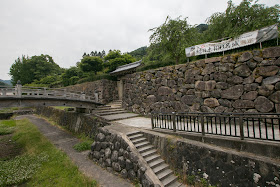








































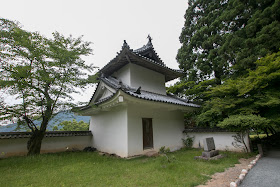















































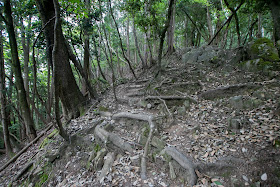











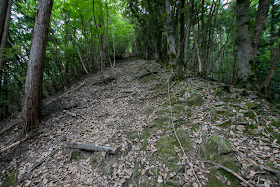















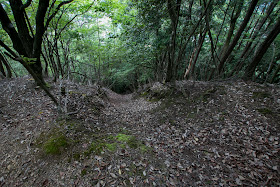


























































































































































































































































































































































































































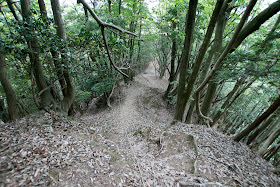










































No comments:
Post a Comment